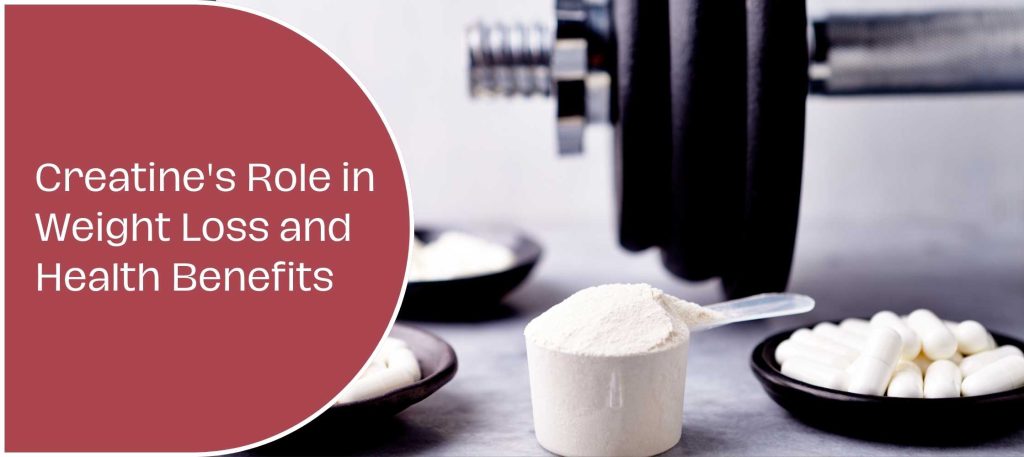|
Getting your Trinity Audio player ready...
|

Have you ever found yourself in a seemingly endless quest for weight loss solutions? Amidst the sea of supplements promising the world, creatine stands out—not just for muscle gain but intriguingly for weight loss too. Let’s dive into how this popular supplement might just be the unexpected ally in your weight management journey.
What is Creatine?
Imagine a compound so integral to your body’s energy system that it’s both created by your organs and absorbed from foods like seafood and red meat. That’s creatine for you—a powerhouse residing mainly in your muscles and brain, aiding in strength, performance, and potentially more. Synthesized by the liver, pancreas, and kidneys, about 1 gram per day, this compound is a testament to the body’s remarkable self-sufficiency and our ongoing quest for enhancement through diet and supplements.
How Creatine Works
Creatine is the silent hero in the saga of energy production within our muscles. Acting as a reserve for high-energy phosphates, it steps into the limelight during those critical moments of explosive action or enduring strength in your workouts. By replenishing ATP (adenosine triphosphate), it’s like giving your muscles a second wind, enabling longer, more intense bouts of exercise. This not only helps in building muscle but indirectly supports fat loss by enhancing overall workout performance.
Creatine and Weight Management: The Connection
The plot thickens when we delve into creatine’s role in weight management. While direct evidence linking creatine to fat loss is nuanced, the supplement’s capacity to boost workout performance and muscle mass can indirectly influence body composition. Increased muscle mass elevates metabolism, potentially leading to greater fat loss over time. Moreover, creatine’s infamous association with water retention is a twist in the tale—it might affect the scale but not necessarily mirror fat loss.
Through a blend of scientific insight and personal anecdotes, we begin to see creatine not just as a supplement but as a character in our personal health narratives. It’s a testament to the complexity of our bodies and the multifaceted approach required for weight loss. So, as we navigate the chapters of diet, exercise, and supplementation, creatine emerges as a potential ally, worthy of consideration and further exploration.
Benefits of Creatine Beyond Muscle Gain
- Cognitive Enhancement: Creatine acts as a diligent worker behind the scenes, enhancing cognitive processes, especially in older adults. It upgrades your brain’s software, improving memory and processing speed.
- Bone and Muscle Support: As we age, our bones and muscles begin to show signs of wear and tear. Creatine steps in as a trusted friend, potentially counteracting age-related declines in skeletal muscle and bone density. It whispers encouragement to our cells, urging them to hold on a little longer, a little stronger.
How to Use Creatine for Weight Loss
Embracing creatine in your weight loss journey is like adding a secret ingredient to your wellness recipe. It’s not just about gulping down a supplement; it’s about orchestrating a symphony with diet, exercise, and creatine playing the lead roles. Start with the basics: a recommended dosage of 3-5 grams per day, timed to dance with your workouts for optimal performance.
But here’s the twist—creatine’s effectiveness isn’t just in the dosage. It’s in the harmony it creates with your lifestyle. Imagine pairing creatine with a balanced diet, rich in fruits, vegetables, and lean proteins, and a workout routine that gets your heart racing and muscles pumping. This trio, working in concert, can elevate your weight loss composition to a masterpiece.
Potential Side Effects and Considerations
Now, every story has its cautionary tales, and the creatine narrative is no exception. While it’s generally seen as a safe guest at the health table, it does come with a few notes to consider. Weight gain, often in the form of lean mass, can appear as an unexpected guest. For those with preexisting kidney conditions, creatine requires a careful approach, akin to navigating a road with potential hazards.
Yet, for the vast majority, creatine sings a tune of safety when taken responsibly. It’s about listening to your body’s cues and conducting your health orchestra with both passion and prudence.
Conclusion
As we draw the curtains on our creatine exploration, it’s clear that this supplement is more than a one-hit wonder. It’s a versatile player in the symphony of health and wellness, with potential benefits stretching from muscle shores to cognitive peaks and bone valleys.
But remember, the journey to weight loss and health is a personal odyssey, one that blends science, personal anecdotes, and a dash of creativity. Creatine, with its multifaceted benefits and considerations, offers a compelling chapter in this journey. Yet, it’s one part of a broader narrative that includes diet, exercise, and a harmonious lifestyle.
As you ponder the role of creatine in your health symphony, consider this: the path to wellness is not just about the supplements we take but about the melodies we create with our daily choices. Let’s compose a health narrative that resonates with vibrancy, balance, and a touch of creativity, shall we?
- Is Chobani Healthy? Benefits and Comparisons - April 22, 2024
- Fatty15 Supplement Review – Benefits, Safety, and User Insights - March 22, 2024
- Dime Beauty Reviews – Honest Insights for Radiant Skin - March 20, 2024
